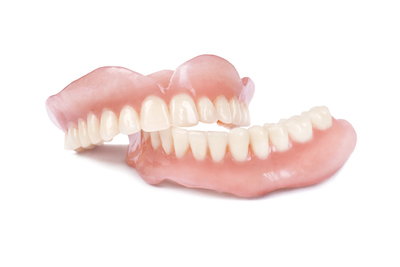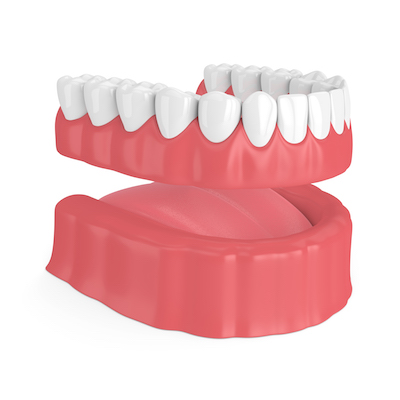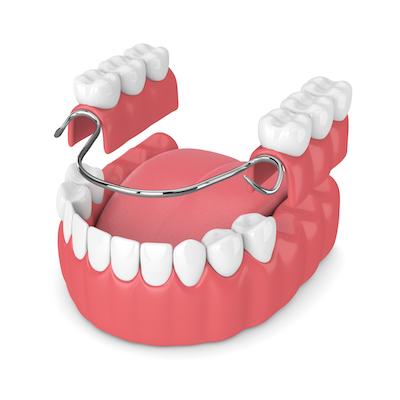 Dentures
Dentures
A denture is a removable replacement for missing teeth and surrounding tissues. Two types of dentures are available – complete and partial dentures. Complete dentures are used when all the teeth are missing, while partial dentures are used when some natural teeth remain.
Complete Dentures
 Complete dentures can be either “conventional” or “immediate.” Made after the teeth have been removed and the gum tissue has begun to heal, a conventional denture is ready for placement in the mouth about 8 to 12 weeks after the teeth have been removed.
Complete dentures can be either “conventional” or “immediate.” Made after the teeth have been removed and the gum tissue has begun to heal, a conventional denture is ready for placement in the mouth about 8 to 12 weeks after the teeth have been removed.
Unlike conventional dentures, immediate dentures are made in advance and can be positioned as soon as the teeth are removed. As a result, the wearer does not have to be without teeth during the healing period.
However, bones and gums shrink over time, especially during the healing period following tooth removal. Therefore a disadvantage of immediate dentures compared with conventional dentures is that they require more adjustments to fit properly during the healing process and generally should only be considered a temporary solution until conventional dentures can be made.
Partial Dentures
 A removable partial denture or bridge usually consists of replacement teeth attached to a pink or gum-colored plastic base, which is connected by metal framework that holds the denture in place in the mouth.
A removable partial denture or bridge usually consists of replacement teeth attached to a pink or gum-colored plastic base, which is connected by metal framework that holds the denture in place in the mouth.
Partial dentures are used when one or more natural teeth remain in the upper or lower jaw. A fixed (permanent) bridge replaces one or more teeth by placing crowns on the teeth on either side of the space and attaching artificial teeth to them. This “bridge” is then cemented into place.
Not only does a partial denture fill in the spaces created by missing teeth, it prevents other teeth from changing position. A precision partial denture is removable and has internal attachments rather than clasps that attach to the adjacent crowns. This is a more natural-looking appliance.
Dentures FAQ
Are There Alternatives to Dentures?
Yes, dental implants can be used to support permanently cemented bridges, eliminating the need for a denture. The cost is usually greater, but the implants and bridges more closely resemble the feel of real teeth.
Dental implants are becoming the alternative to dentures but not everyone is a candidate for implants. Consult your dentist for advice.
Does Insurance Cover the Cost of Dentures?
Most dental insurance providers cover some or all of the cost of dentures. However, contact your company to find out the specifics of what they will cover.
How Are Dentures Made?
The denture development process takes about three weeks to 1.5 months and several appointments. The general steps are to:
- Make a series of impressions of your jaw and take measurements of how your jaws relate to one another and how much space is between them.
- Create models, wax forms, and/or plastic patterns in the exact shape and position of the denture to be made. You will “try in” this model several times and the denture will be assessed for color, shape, and fit before the final denture is cast.
- Cast a final denture.
- Adjustments will be made as necessary.
Will Dentures Make Me Look Different?
Dentures resemble your natural teeth so there should be no noticeable change to your appearance. In fact, dentures may even improve your smile and fill out your facial appearance.
Will Eating With New Dentures Be Difficult?
Eating with new dentures will take a little practice and may be uncomfortable for some wearers for a few weeks. To get used to the new denture, start with soft foods cut into small pieces.
Chew slowly using both sides of your mouth. As you get used to your new dentures, add other foods until you return to your normal diet. Be cautious with hot or hard foods and sharp-edged bones or shells.
Additionally, avoid foods that are extremely sticky or hard. You may want to avoid chewing gum while you adjust to the denture. Also, don’t use toothpicks while wearing dentures.
Will Dentures Change How I Speak?
After you get dentures, you may have difficulty pronouncing certain words. If so, practice by saying the difficult words out loud. With practice and with time you will become accustomed to speaking properly with your denture.
If your dentures “click” while you’re talking, you should contact us. Your dentures may occasionally slip when you laugh, cough, or smile. Reposition the dentures by gently biting down and swallowing. If any speaking problem persists, it's time to consult your dentist or prosthodontist.